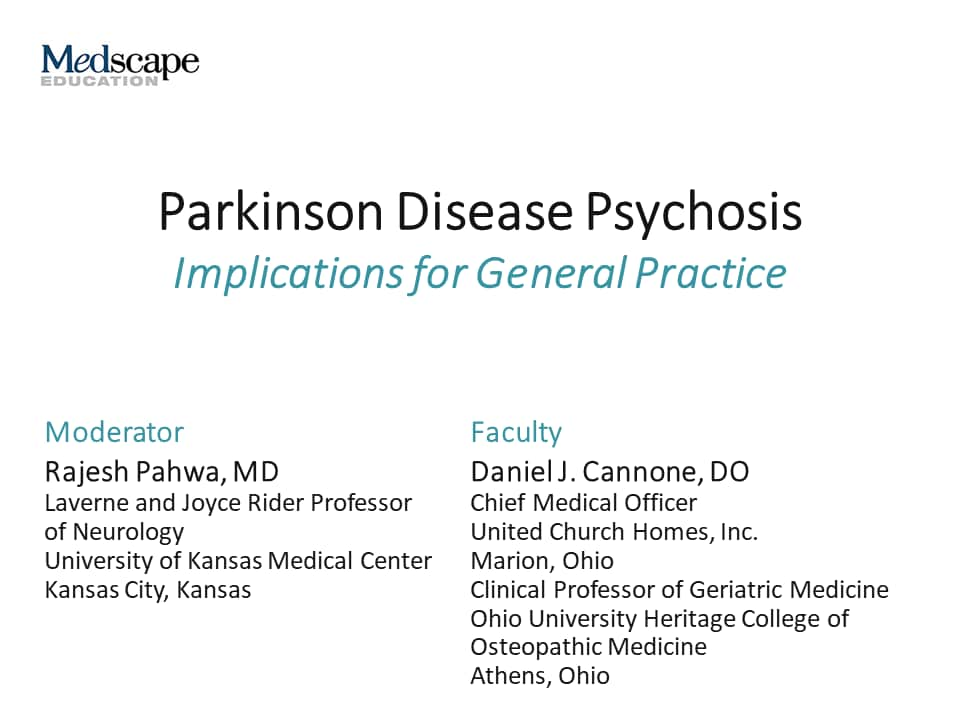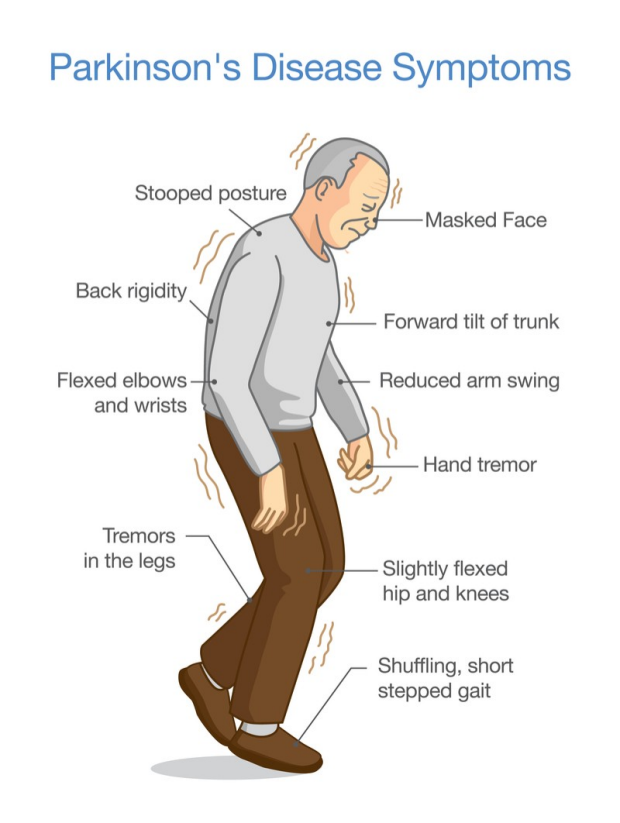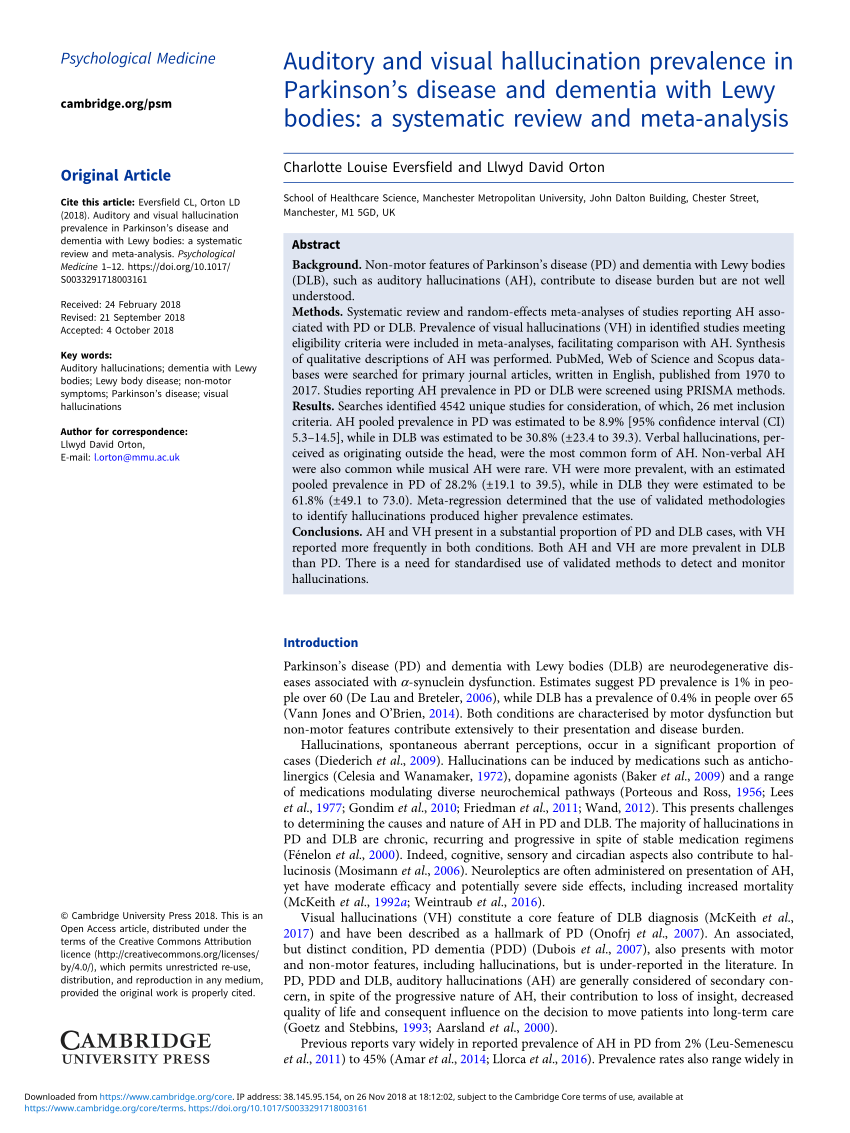Demystifying Hallucinations Night Terrors And Dementia In Parkinsons
This two-hour webinar includes extensive discussion about hallucinations, delusions, illusions and other examples of Parkinsons psychosis in Parkinson’s. Presenters: Rohit Dhall, MD, MSPH and Vergilio Gerald H. Evidente, Director, Movement Disorders Center of Arizona in Scottsdale. Pay particular attention to Dr. Rohit Dhalls description of the causes of PD psychosis as well as treatment options and what to discuss with your movement disorder specialist. Dr. Evidente gives a clear description on differences in PD dementia, Alzheimer’s and other dementias.
What To Do About Parkinsons Hallucinations
Hallucinations or other signs of Parkinsons psychosis should be discussed with a doctor. Depending on the cause and severity of hallucinations, the person may or may not need treatment. If an infection is the cause, it should be treated accordingly. A doctor may want to change or reduce the dosage of any medications that could cause hallucinations to stop Parkinsons psychosis.
In mild cases of hallucinations, the person may be aware that the images are not real. In these cases, if the hallucinations are not causing any distress, pharmaceutical treatment may not be necessary. Sometimes improved lighting in darkened or shadowy areas may help reduce occurrences.
Sometimes the person may not realize he or she is hallucinating. In these cases, especially if the hallucinations are severe and disturbing, a doctor may recommend adjustments to the persons current Parkinsons medications. However, this could potentially worsen movement-related Parkinsons symptoms. If these symptoms affect the persons quality of life, a doctor may instead recommend antipsychotic drugs, particularly clozapine or quetiapine, which typically help reduce hallucinations without affecting other Parkinsons symptoms.
What Should I Do When My Loved One Is Experiencing A Hallucination
Most importantly, dont try to convince your loved one that what theyre experiencing isnt real. Theyll feel like youre putting down an experience that seems authentic to them.
Once a person has lost insight, itll be very difficult to convince them that what theyre experiencing isnt happening. Trying to argue with them may agitate and even enrage the person. Making them anxious could cause their hallucinations to get worse.
Instead, talk to the person gently and reassuringly. You might say something like, I understand that you see a dog in the corner of the room. Everything is going to be OK. Youre safe. You might even say that the dog must have left already.
Remember that the person cant control what theyre experiencing. Try to be as sympathetic as you can when you talk to them.
One approach that can help is to turn on all the lights in the room. Hallucinations are more likely to happen in dimly lit areas, and this can be caused by disease-related changes that affect the eyes.
Then, have the person really focus on what theyre seeing. That may reset their brain and help them see whats actually in front of them.
If the person doesnt have insight, try a distraction. Move them to a different room. Turn on the TV or play a game they like.
Try to keep your loved one as calm as possible. If they become very agitated or violent, call their doctor or 911.
Read Also: Serotonin Syndrome And Parkinson’s
Showing Up As Your Best Self
Caring for someone with a progressive condition like Parkinsons disease can be challenging. Hallucinations only add to the stress of caregiving, especially if the person youre caring for doesnt have insight into what theyre experiencing.
The more you understand about your loved ones condition, the easier itll be to care for them. Talk to their doctor and read up on Parkinsons disease so youre better equipped to respond when hallucinations occur.
Dont forget to take care of yourself as well. Take regular breaks from caregiving to relax and do the things you enjoy. By tending to your own needs, youll have more energy to devote to your loved one.
How Commonly Do Parkinsons Disease Patients Develop Psychosis

Psychosis in Parkinsons disease generally comes in two forms: hallucinations or delusions . When hallucinations occur, they are mostly visual . Sometimes, they can be threatening, but this is less common. Auditory hallucinations are rare in Parkinsons disease and if they do occur, they are usually accompanied by visual hallucinations.
Delusions are usually of a common theme, typically of spousal infidelity. Other themes are often paranoid in nature Because they are paranoid in nature, they can be more threatening and more immediate action is often necessary, compared to visual hallucinations . It is not uncommon that patients actually call 9-1-1 or the police to report a burglary or a plot to hurt them.
Unfortunately, psychosis occurs in up to 40% of Parkinsons disease patients . In the early stage of Parkinsons disease psychosis, the patient often still has a clear understanding and retains their insight, but this tends to worsen over time and insight may eventually be lost. At later stages, patients may be confused and have impaired reality testing that is, they are unable to distinguish personal, subjective experiences from the reality of the external world. Psychosis in Parkinsons disease patients frequently occurs initially in the evening, then later on spills into the rest of the day.
Also Check: Non Shaking Parkinson’s Disease
Hallucinations And Delusions In Pd
Hallucinations and delusions are collectively referred to as psychosis.
Visual hallucinations are the most common type of hallucination. In a visual hallucination, someone sees things that are not actually there. There can also be auditory and olfactory hallucinations. Often hallucinations are not alarming to the person experiencing them.
Delusions are when there is an alternative view of reality: an entire irrational story is created. Paranoia is a common type of delusion. Capgras delusions are a specific type of delusion where the person believes that a spouse, adult child, or other family member has been replaced by an imposter.
What Is A Delusion
A delusion is a thought or belief that is not based on reality, as opposed to a hallucination which involves seeing, hearing, tasting or feeling things that do not exist.
People who experience delusions may be convinced that they are true, even though they are irrational – for example paranoia – that someone is trying to cause them harm or that there is a conspiracy against them. Delusions can be difficult to overcome, particularly if they involve a carer or other close contact, as they may provoke suspicion, mistrust or jealousy and so strain relationships. Severe delusions can cause anxiety or irritability, especially if the person finds it difficult to tell whether things are real or not.
Some people with Parkinson’s experience a mixture of delusions, hallucinations and illusions which may make them feel confused and impact on daily life.
Don’t Miss: Parkinson’s Dbs Side Effects
Common Causes Of Hallucinations
Hallucinations most often result from:
- Schizophrenia. More than 70% of people with this illness get visual hallucinations, and 60%-90% hear voices. But some may also smell and taste things that aren’t there.
- Parkinson’s disease. Up to half of people who have this condition sometimes see things that aren’t there.
- Alzheimer’s disease. and other forms of dementia, especially Lewy body dementia. They cause changes in the brain that can bring on hallucinations. It may be more likely to happen when your disease is advanced.
- Migraines. About a third of people with this kind of headache also have an “aura,” a type of visual hallucination. It can look like a multicolored crescent of light.
- Brain tumor. Depending on where it is, it can cause different types of hallucinations. If it’s in an area that has to do with vision, you may see things that aren’t real. You might also see spots or shapes of light. Tumors in some parts of the brain can cause hallucinations of smell and taste.
- Charles Bonnet syndrome. This condition causes people with vision problems like macular degeneration, glaucoma, or cataracts to see things. At first, you may not realize it’s a hallucination, but eventually, you figure out that what you’re seeing isn’t real.
- Epilepsy. The seizures that go along with this disorder can make you more likely to have hallucinations. The type you get depends on which part of your brain the seizure affects.
Talk About Your Hallucinations And Delusions
Your hallucinations or delusions can be distressing for those around you. They may be unsure how to react so let them know what you are going through and how best they can help you. They will be more able to support you if you share your experiences with them, particularly if you know what the most common triggers are and what can be done to make the hallucinations or delusions go away.
Counselling can sometimes be helpful, particularly if the hallucinations or delusions strain relationships. Your doctor will be able to advise on the available types of counselling.
Read Also: Parkinson’s And Physical Therapy
Bringing Light To Darker Side Of Parkinsons
Often the hardest part of Parkinsons disease psychosis is the fear of the unknown. As a person with Parkinsons, you may worry about having hallucinations and/or delusions and not being able to do anything about it. As a care partner, you may worry that you wont be able to help your person with Parkinsons feel safe if something does happen.
The good news is you now have information on what Parkinsons disease psychosis is the risk factors to look out for biological and environmental triggers that can bring them on and how to manage them if they show up.
But what about the emotional toll these types of symptoms can place on you over the long-term as the person with Parkinsons or as a care partner?
The diagnosis of a chronic illness in and of itself requires a lot of adjustments. When you add something like Parkinsons disease psychosis into the mix, its important that you also add another level of self-care to your everyday life.
Treatment And Management Of Hallucinations
You should discuss any hallucinations or delusions with your doctor, or Parkinsons nurse if you have one, so that all treatment options can be considered.
In mild cases no specific action may be required and simple reassurance that the images, sensations or sounds are harmless may be all that is needed.
You May Like: Foods Not To Eat With Parkinson’s Disease
A Caregivers Guide To Parkinsons Disease Psychosis
While more than 50% of those taking carbidopa-levodopa may experience psychosis , medication management of these symptoms is a balancing act. First, families must bring psychotic behavior to the attention of your medical team. Medical causes of the behavior, like infection must be ruled out, followed by a review of medications and possible medication adjustments before a lifestyle changes and possible medications for treatment are added.
Parkinson’s Disease Psychosis: The What When Why And How

Psychosis is a psychiatric term used in neurology to refer to a spectrum of abnormalities. Parkinsons disease psychosis is where people experience hallucinations or delusions. Hallucinations is seeing, hearing, or smelling things that dont exist. With tactile hallucinations, one can feel a presence that isnt there. Delusions are believing something that is not true, like that a spouse is being unfaithful or caregivers are stealing. In this one-hour talk, movement disorder specialist Christopher Goetz, MD, focuses on hallucinations and spends a little time on delusions.
You May Like: How Long Do You Live With Parkinson’s Disease
Psychosis: A Mind Guide To Parkinsons
Can be downloaded as a PDF or ordered the Parkinson’s Foundation online store. This 40-page booklet is a thorough guide to all aspects of Parkinsons psychosis, including symptoms, causes, treatment options, coping strategies for both the family and person experiencing the psychosis, and a chapter on tips for caregivers.
Hallucinations Delusions And Parkinson’s
It is estimated that about 50% of people with Parkinsons will, at some point, experience hallucinations. They can affect younger people but are more often associated with those who are older and have had Parkinsons for some time.
Hallucinations experienced early in Parkinsons may also be a symptom of the condition dementia with Lewy bodies so it is important to let your doctor know if hallucinations begin at an early stage.
Parkinsons itself can be a cause of hallucinations and delusions, but very often they are a side effect of certain medications used to treat the condition. Not everyone who takes Parkinsons medications will experience hallucinations and delusions though. This varies from person to person and is often related to the particular type of medication and dosage.
Other factors may also be involved such as underlying illness, memory problems, sleep difficulties and poor eyesight.
Also Check: Boxing And Parkinson’s Disease
What Makes Some People With Parkinsons More Susceptible To Parkinsons Disease Psychosis
Not everyone living with Parkinsons will experience hallucinations and/or delusions, but there are several things that can increase your risk. Here are a few to look out for. Be sure to speak to your doctors and care partners if you notice any changes.
- Increased sleep disturbances such as REM Sleep Behavior Disorder, sleep apnea, vivid dreaming and sleep interruptions
- Vision problems such as blurry or double vision
- Hearing problems
- Aging
- Medication changes such as new medication, dosage changes and drug interactions
- Disease progression
Examples Of Delusions In Pd
- Jealousy
- Belief: Your partner is being unfaithful.
- Behavior: Paranoia, agitation, suspiciousness, aggression.
You May Like: Parkinson’s And The Mind
What Triggers Psychosis In Parkinsons Disease
Psychosis in Parkinsons disease is believed to be due to long term use of parkinsonian medications especially dopaminergic and anticholinergic drugs . However, significant medication exposure is no longer a pre-requisite in Parkinsons disease psychosis . The continuum hypothesis states that medication-induced psychiatric symptoms in Parkinsons disease starts with sleep disturbances accompanied by vivid dreams, and then develops into hallucinations and delusions, and ends in delirium. However this theory is now being challenged .
What Causes Parkinsons Disease Psychosis
Parkinsons is a brain disorder associated with a loss of dopamine-producing nerve cells deep inside the brain. Dopamine is a neurotransmitter that helps regulate the bodys movement, and it also allows us to think clearly and regulate our emotions. When you try to replace the dopamine thats been lost in a person with Parkinsons, it can cause the system to get out of whack which can impact thinking, how visual things are processed and more. Parkinsons disease psychosis is therefore typically a side effect of the disease itself or the medications used to manage it.
As a result, its an ongoing balancing act for Parkinsons doctors to prescribe enough dopamine to control a person with Parkinsons motor symptoms, but not so much that the person experiences hallucinations and/or delusions.
You May Like: Are There Stages Of Parkinson’s Disease
Hallucinations And Delusions In Parkinsons Disease
It might be surprising to learn that 20 to 30 percent of people with Parkinsons disease will experience visual hallucinations. While typically not a symptom of PD itself, they can develop as a result to a change in PD medication or as a symptom of an unrelated infection or illness. It is important to know the signs of hallucinations and how to manage them.
Hallucinations and other more severe perceptual changes can be distressing to family often more so than to the person experiencing them. For the well-being of people with PD and caregivers, it is important to identify hallucinations as early as possible and take steps to reduce them.
The following article is based on the latest research and a Parkinsons Foundation Expert Briefings about hallucinations and delusions in Parkinsons hosted by Christopher G. Goetz, MD, Professor of Neurological Sciences, Professor of Pharmacology at Rush University Medical Center, a Parkinsons Foundation Center of Excellence.
What Is A Hallucination

A hallucination is a perception of something that does not actually exist. This may be visualised, heard, felt, smelled or tasted. Hallucinations are sometimes confused with illusions, which are distortions of a reality rather than something that is purely imagined – as with hallucinations.
Visual hallucinations: In Parkinson’s, hallucinations are most commonly visual and may be in black and white, in colour, still or moving. Often the images involve small animals and children. They may disappear quickly or may last for some time.
Auditory hallucinations: auditory hallucinations are less common. These generally involve hearing voices or other familiar sounds. Auditory hallucinations can also be part of a depressive symptomatology.
Tactile hallucinations: hallucinations may be tactile, that is, you may feel a sensation, like something touching you.
Smell and taste hallucinations: less commonly you may feel that you can taste something you havent eaten, or you may smell something that is not present, such as food cooking or smoke.
Usually hallucinations are not threatening or distressing. If you hallucinate you may be unaware that your perceptions are not real, and sometimes imagined images or sensations can be comforting. But hallucinations can also be distressing and you may feel threatened or frightened and may need reassurance and comfort from those around you.
Read Also: Can You Reverse Parkinson Disease
What Is Parkinsons Disease Psychosis
Parkinsons disease psychosis is a non-motor symptom of Parkinsons disease that causes patients to experience hallucinations and/or delusions.More than half of all patients with Parkinsons disease eventually develop symptoms over the course of their disease.1
Diagnosing and treating this condition can be complex. The condition relates to both neurology and psychiatry . For this reason, Parkinsons disease psychosis is considered a neuropsychiatric condition, since it deals with mental health symptoms caused by a disease of the nervous system .
Introducing an easier way to track your symptoms and manage your care.
Dont want to download the app? Use the non-mobile version here.